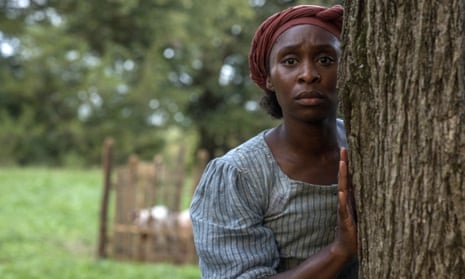History, heroism and leadership are the stuff of Kasi Lemmons’ rousing and heartfelt film about the life and times of Harriet Tubman, the Spartacus of the American south.
Cynthia Erivo gives a terrific star performance as Tubman, a slave who suffers from blackouts and religious visions, after being assaulted as a child, which give her a miraculous self-possession and confidence in her own destiny. Erivo embodies Harriet’s courage, resourcefulness, physical toughness, talent (and relish) for disguise and untutored genius for guerrilla warfare. The result falls somewhere between a slave-escape drama, an action thriller, a western and even an unexpected kind of superhero film. It’s a winning combination, although Lemmons does not immerse us in the agony and injustice of slavery as such; she puts together a well-crafted movie that is the showcase for an excellent performance from Erivo.
Born Araminta Ross on a US slave plantation in the early 19th century, Tubman did not merely escape to the abolitionist north – where she took the new freedom name Harriet – but led impossibly daring sorties back into enemy territory to rescue more enslaved field hands. She became a legendary conductor of the “underground railroad”, the network of covert refuges and safe passage routes that helped slaves reach freedom – and the existence of which became an intolerable, defiant provocation to what was to become the Confederacy. Lemmons’ movie, co-written with Gregory Allen Howard, shows Tubman becoming a mythical figure, with some plantation owners simply unable to believe that she is a black woman and preferring to think that she must be a northerner in blackface disguise, a wilful misapprehension which only helps Tubman in her work. The film argues that Tubman was not merely a client of the underground railroad but someone who effectively kept it alive.
As a young woman, Araminta is married to a local free man, a partnership entered into on the understanding, given by an ancestor of the present plantation owner, that she and her family would be given their freedom. That understanding is angrily rejected by the master, provoking a confrontation between Araminta and the master’s cruel and capricious son (Joe Alwyn), who is broodingly obsessed by her, as she was the slave who nursed him as a child. When she runs away, he makes it his personal business to take her back alive. But it is her father (a lovely, nuanced performance from Clarke Peters) who alerts her to the railroad and the path to freedom. Her final escape and her fate create her mythical lustre, but also an awful new twist of loneliness and betrayal in her home life.
This film may not reach the height of inspiration in every frame, but it could be that Lemmons is not interested in fetishising and aestheticising every dire circumstance, wishing instead to drive forward the story in an approachable, conventional way. She certainly offers a springboard for a tremendously charismatic and muscular performance from Erivo, who may well be in the frame for awards. Hollywood is still notably reticent about the slavery era, despite the success of Steve McQueen’s 12 Years a Slave, and Lemmons’ achievement is to tell a story that does not accept slavery as a tragic and immutable fact, and to dramatise the people who took action against it.
